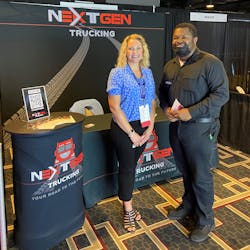High schools—and even middle schools—need more trucking programs if the industry has any chance of recruiting the next generation of talent. That’s where the Next Generation in Trucking Association (Next-Gen Trucking) comes into play.
An indicator of growth for the association is having trucking programs started at high schools throughout the U.S. According to Lindsey Trent, president and co-founder of Next-Gen Trucking, right now, there are about 3,000 construction programs at high schools across the country, and there are 1,200 woodworking programs and 1,400 automotive programs. However, there are some 185 diesel technician programs and fewer than 10 commercial truck driving programs, she stressed.
“There is $1.3 billion in federal funding every year that goes to career technical education,” Trent explained. “Right now, it’s going to all those other industries because they have more programs created, so we really want to make a bigger impact for our industry.”
See also: Women in Transportation 2022: Trailblazers in trucking
Next-Gen Trucking officially launched in July 2021 as a grassroots association. Trent, who has worked in trucking for 10 years, helped formed the association and has been working there full-time since January.
Based in Louisville, Kentucky, Trent started off her career in driver staffing. She knew nothing about the industry when she started out.
“When I started the job, I really fell in love with it and decided to stick with it,” Trent told FleetOwner. “I did that job for six years. The company sold to a different company, and at that time I went ahead and moved to Ryder. The last four years I worked in sales at Ryder and then I left to go full-time with the association.”
Next-Gen Trucking formed to combat the industrywide labor shortage problem at its core. While at an industry conference, Trent got word of Dave Dein, who had started a high school truck driving program at Patterson High School in California. She got his contact information, gave Dein a call, and the two discussed the idea of creating a nonprofit trade association to duplicate his program across the country.
“A lot of high schools and middle schools have career exploration classes in general, and we want to make sure trucking is represented in those,” Trent said.
See also: Women in Transportation 2022: Fleet safety director: Creating a legacy of 'SHEroes'
Today, the association has about 170 members, varying among companies, schools, and individuals. Some of those members include trucking companies large and small, private carriers, food distributors, full truckload companies, less-than-truckload operations, dealers, and OEMs.
Trent is also on the advisory board of several area high schools for diesel technician programs. Furthermore, she attends various industry conferences and technical skills competitions to help get the word out and potentially attract more talent to trucking.
One of the biggest challenges facing what Next-Gen Trucking is trying to accomplish is that under the current federal law, drivers must be at least 21 years old to drive interstate. The association welcomes the federal Safe Driver apprenticeship pilot program, which examines how safely 3,000 under-21 drivers operate across state lines.
Trent stressed the importance of also helping trucking companies that can’t hire a driver until they are 21 to still see the value in creating career paths for younger generations.
“That is always a big challenge of what we are trying to do,” Trent explained. “What we are doing is not a quick fix. We are trying to solve the problem at the core. Some people look at that and say, ‘we need like 50 drivers today.’ And I understand that, but we’ve got to fix the problem. We firmly believe that working with education and reaching Gen Z is how we will create that skilled workforce.”
See also: Women in Transportation 2022: Technician crushes common shop stereotypes
To appeal to Generation Z, which ranges from ages 10 and 25, Next-Gen Trucking is working with carriers to create educational resources detailing why trucking is a good fit for these tech-savvy digital natives. Since the association’s inception, Next-Gen Trucking has met with more than 60 high schools across the country, many of which have expressed interest in creating truck driver training programs, Trent noted.“A lot of them have never gotten into a cab of a truck,” Trent said of Gen Z. “So, it’s about making sure that they see all the advances in technology in a truck and in the engine of a truck. They also like the fact that if you’re in trucking, you’re making a huge impact in our economy and our country. We all saw from COVID that if a truck stops and we don’t have our supplies, the world basically falls apart.”
Gen Z is also very entrepreneurial, Trent added. Therefore, the idea of owning their business as an owner-operator could be incredibly appealing to the up-and-coming workforce.
“There are so many jobs in trucking,” Trent emphasized. “You can be a driver your whole career and make a great living, but a lot of drivers start out driving and then they become safety directors, HR professionals, dispatchers, and operations managers. Really showcasing the career path in trucking is what we need to do in this industry.”
About the Author

Cristina Commendatore
Cristina Commendatore is a past FleetOwner editor-in-chief. She wrote for the publication from 2015 to 2023.

